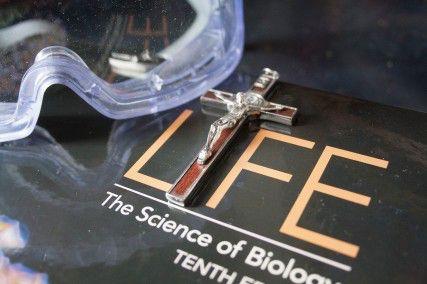
The rift between religious participants and scientists at scholarly academic institutions such as Boston University may not be as large as many people perceive.
“There has been a great deal of debate about how religion and science do and should relate to each other, but often it is a small, vocal minority that receives the most attention,” said coauthor of a study released Sunday, Christopher Scheitle, a professor of sociology at Saint John’s University.
Members of the Boston University community offered several different responses to the study’s conclusions.
“It depends first on how you define religion and how you define science,” said Gina Cogan, a professor in BU’s Department of Religion. “I don’t think that you can look at Christians in the United States and say that they are a monolithic group.”
The study, also coauthored by Rice University sociology professor Elaine Howard Ecklund, found 36 percent of scientists polled in the study said they had “no doubts” about the existence of God, and 56 percent of the general public expressed the same opinion.
“We wanted to collect data that would provide a more representative picture of what the general population and different groups within that general population think about these issues,” Scheitle said.
The survey stated that 18 percent of scientists claim to attend religious services weekly. For the general public, that figure was 20 percent.
Evangelical Protestants are more likely than the general public to believe that science and religion can work together, the study stated.
Cogan, who specializes in the study of Asian religions, said many eastern religions do not present a challenge to scientific findings.
“If you break down the definitions, what seems to be religion is not actually religion,” she said. “In Japanese Buddhism, there have not been conflicts between scientists and Buddhists.”
BU professor of biology William Eldred said scientific principles such as evolution are often incompatible with conservative religious viewpoints.
“The two are contradictory,” he said. “There are religions that are focused on nature, and not the bible, that are more compatible with science.”
Twenty-five percent of Evangelical Protestants favor teaching creationism along with evolution in public schools, while only 14 percent of scientists felt the same way, the study stated.
Several BU students said a discrepancy exists between religious followers and scientists.
Emily Chen, a College of Fine Arts sophomore, said science and religion could converge in the future.
“They’re not compatible at this point in time because there are still a lot of prejudices,” she said. “People in religion and in [people] science need to be more open-minded.”
College of General Studies freshman Eliza Zhitnik said science and religion do not necessarily oppose one another.
“In the context of the Bible and the Torah, [they] are compatible,” said Zhitnik. “Most people don’t take these texts literally. Not a lot of the Bible and the Torah disagree with science.”
“I don’t think the divide will get smaller over time,” said Josh Goldenberg, a College of Communication senior. “There are really scientific people and there are really religious people. You have to pick your side.”
Goldenberg said conflicts between science and religion could be found on an everyday basis.
“You see it everywhere,” he said. “Creationism versus evolution, intellectuals versus the religious. This issue is always on society’s debate platform.”
This is an account occasionally used by the Daily Free Press editors to post archived posts from previous iterations of the site or otherwise for special circumstance publications. See authorship info on the byline at the top of the page.



